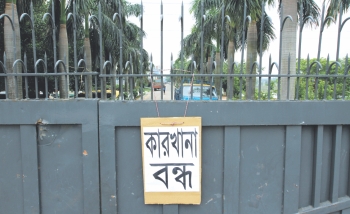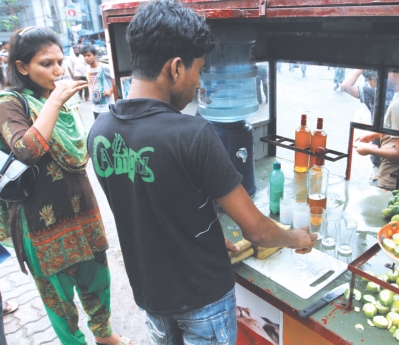| Home - Back Issues - The Team - Contact Us |
 |
| Volume 11 |Issue 27| July 07, 2012 | |
|
|
Letters Greener Vegetables The article "Greener Vegetables", published last week, provides us with a ray of hope. The number of deaths caused due to the spraying of poisonous chemicals on fruits, have risen alarmingly. Most farmers are unaware about the bad effects that chemicals have on their crops. These chemicals are dangerous not only for human beings, but also pose a serious threat to the environment in the long run. Through the article we have come to know that some farmers in Chuadanga and Manikganj have been successful in using 'bio-pesticides'. This process is safe and should be followed elsewhere. Since it is not possible to privately practice this system all over the country, our government should take proper steps to implement it. M N Islam sarker *** I would like to thank the Star for its wonderful cover story, entitled "Greener Vegetables". It was a fascinating write-up, which informed us about the harmful effects of the chemicals used by farmers. Sharmin Hossain, the brain behind Fresh and Safe Agro Limited, (FASAL) is one of the few entrepreneurs to have dedicated herself in replacing harmful chemicals with safe and healthy bio-pesticides. Agriculture is often described as the 'life-blood' of the nation. Our farmers are a regulatory force in modern times. Sharmin Hossain, with her own initiative, has started a silent revolution in the advancement of this sector. She is a visionary entrepreneur and in my opinion deserves a National Award for her work. Let us hope her work spreads throughout the nation and that many more farmers are encouraged to use bio-pesticides. Abul Ashraf Noor On Garments Industry
The last couple of years have seen unrest in garments and knitting factories. These incidents of unrests have lead to death of many and have also caused damage to property. Garment and knitting factories have been contributing to the country's economy in a huge manner. There is no doubt the low wages of workers is one of the major reasons behind the resentment of thousands of workers, as they live in the costly areas of the country. The concentration of labour intensive factories at such locations is a significant factor that industrialists ignored at the time of choosing factory sites. Labour unrests have frequently taken place at garment and knitting hubs. Therefore, it isn't wise to set up too many labour-intensive factories in one place. Recent events suggest that the smallest of labour problems can spread to different factories and consquently develop a riot-like situation. The promoters of labour intensive ventures, therefore, should think before selecting the location of their factories. Md Ashraf Hossain Dirty Food
The article “Dirty Drinking”, published on 22nd June, 2012, was extremely informative. It made me realise about the harmful effects of catching a drink outside. But, what about the dangers of unhygienic food? As dwellers of a metro city, we have become accustomed to the unhygienic food sold on the roads. Most of us don't have any clue as to how polluted or dangerous the food can be. This is one of the reasons why people suffer from diarrhoea and water-borne diseases throughout the year. It is our responsibility to let people know about the dangers lurking around these food joints. Parents should be careful of their children's' eating habits. Religious leaders can speak on these issues before the daily prayers. Various community leaders should also take a stance against these joints and inform the public regarding the harmful effects at social gatherings. Md NasirUddin Rohingya Issue Due to ethnic riots, many Rohingyas have fled from the Arakan province in Myanmar (Burma). Rohingyas have been living in this region since the prehistoric time; however, still they haven't been recognised as citizens by the Myanmar government. They are frequently discriminated and have often been forced to leave their country. During the 90s, a staggering five lakh Rohingyas fled to Bangladesh. The Myanmar government has never showed any interest in taking back the refugees. This time, though, our government did not allow the Rohingyas to enter. Leaders from different countries must come forward to stop the ethnic conflict in Myanmar and force the Myanmar government to recognise the Rohingyas as citizens of the country. Mohammed Zonaed Emran
Copyright (R) thedailystar.net 2012 |
|||||||||


